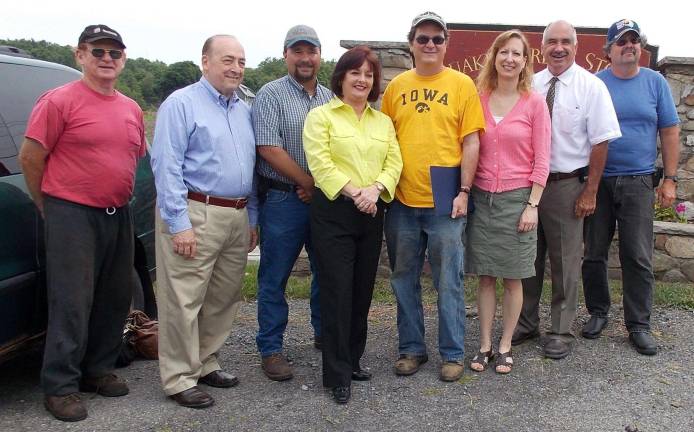Rabbitt honors Black Dirt advocate

GOSHEN —Assemblywoman Annie Rabbitt (R-I-C-Greenwood Lake) honored local onion farmer and agriculture advocate Chris Pawelski in her effort to highlight the current needs of the Black Dirt agricultural community.
“Our community, the Black Dirt Region and all of our state’s onion farmers are very lucky to have Chris Pawelski,” the assemblywoman said in presenting Pawelski with a copy of a State Resolution passed in his honor. “For four generations the Pawelski family has been a leader in onion farming and Chris has certainly been a most dedicated advocate for the industry and our region.”
Pawelski responded in kind: “Assemblywoman Rabbitt has been one of the longest and strongest friends for our farming community. In numerous issues over the years she has been a fierce advocate on our behalf. For example, in terms of the dreadful farm labor bill Annie has forcefully and eloquently represented our position and corrected the false statements and misinformation that has often smeared our industry and community.”
Rabbitt and Pawelski have worked together to urge state lawmakers to abandon labor mandate legislation and to clean up sediment from the Wallkill River to prevent future flooding. They also have worked together to reduce the speed limit on portions of the Pulaski Highway to allow for safer traffic along farmlands and for farmers moving from field to field along the highway on farm equipment such as tractors.
The advocate
Although Pawelski’s family has been farming onions in the region for generations, Chris Pawelski has become one of farming’s most vocal advocates for his efforts to raise awareness for family farms, onion farming and the Black Dirt Region.
Along with making multiple trips to both Albany and Washington, D,C., to advocate for agriculture and lobby lawmakers, Pawelski has successfully brought attention to the struggles of today’s farmers with ideas such as auctioning a bag of onions on eBay for $150,000 and suing the United States Department of Agriculture over crop insurance.
In addition, Pawelski authored the semi-autobiographical book, “Muckville: Farm Policy, Media and the Strange Oddities of Semi-Rural Life.” Based on his own experiences as a multi-generation family farmer, an agricultural advocate and lobbyist, Pawelski is working with an editor and currently shopping the book to publishers with the hope the any revenue earned from the book will help support the 100-acre farm he currently runs with his wife, Eve, and their children and Pawelski’s father and brother.
The weather
Pawelski has been particularly vocal in his advocacy following weather that has threatened the state’s or region’s farming industry. In the wake of a hailstorm in 1996, he advocated for the onion farmers who were facing complete crop loss.
Following Hurricane Irene, Tropical Storm Lee and Superstorm Sandy, Pawelski has spent equal time lobbying lawmakers for relief aid and support as he has spent out on his tractor (making calls from his cell phone helps him multi-task).
Pawelski’s top fight now is to assist farmers on the Eastern Seaboard who suffered from crop loss after decades of floods and, in particular, the destruction caused by Hurricane Irene, which hit farms right at harvest time.
He has been working together with Rabbitt and other local, state and federal officials to bring aid into the region but says that more needs to be done to address the crop loss.
“Despite recovery aid, the ‘elephant in the room’ is our crop loss after Hurricane Irene and virtually nothing has been done.,” Pawelski said. “We recognize that the bulk of the responsibility comes from the federal government but believe that leaders like the Governor could have fought more vigorously like they have for Sandy relief. Assemblywoman Rabbitt has been our voice, but maybe some other persons, especially from downstate or urban areas who love farmers’ markets in their communities, need to recognize that fresh produce found at those markets is not produced by magic.
“Yes, with Sandy the scope was larger but after Irene and Lee many of us lost virtually our entire crops at the worst possible time, before harvest, when all of our expenses have been spent yet nothing has been sold. That is like losing your job and all the money in your bank account, with nothing to replace them,” Pawelski continued. “If the farms cannot survive such disasters, or if the state passes misguided farm labor bills it does not understand, well, those farms will go out of business. Where do these ‘leaders’ propose the food should come from then after that happens? Maybe, just maybe, they need to listen more to their upstate or rural community legislators like Assemblywoman Rabbitt.”
The citizen
Rabbitt said Pawelski was “proof that one determined person can make a real difference for their community,” and credited him with being responsible for the millions of dollars that have been invested in the Black Dirt region and onion farming in the state.
“Agriculture is truly the backbone of our state – our economy, but also our quality of life,” she said. “Having locally produced, nutritious foods is vital to every member of our community. Keeping our rural landscapes maintained is important for us all. Every farmer out there does so much against insurmountable odds, but Chris truly has done more than anyone would have expected and is truly an exemplary citizen that I’m lucky enough to also call a friend.”
New York State’s onion farming industry produces annual sales of roughly $52 million and accounts for 97 percent of onion production in the northeast United States. New York State’s onion industry ranks sixth in the nation.
Essential information
To learn more about Chris Pawelski, visit his blog at: http://muckingitupinmuckvillve.wordpress.com/tag/chris-pawelski/ or follow him on Twitter.
Constituents – including area farmers – are encouraged to join the conversation online with the assemblywoman. Find her on Facebook or Twitter or e-mail her at rabbitta@assembly.state.ny.us.